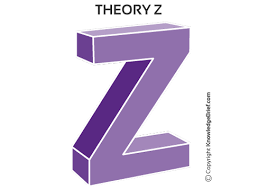Motivation, one of the most powerful tools of management, can be defined as something that creates initiative among people. If the right needs of the employees are targeted at the right time an organisation can reach a completely different level of success. One of the most popular theories of motivation includes Ouchi’s Z Theory.
Theory Z suggests that a trusting and caring relationship between both, the leaders and the followers and among the employees is essential. People feel motivated because they have a sense of mutual trust. Also, providing a job for life increases their sense of loyalty towards the company as it encourages the well-being of the employees.
ASSUMPTIONS
Some of the assumptions about the workers include:
- Workers have a tendency to establish happy and intimate working relationships with their supervisors and with, as well as their co-workers.
- Deep inside all workers need to be supported by the company. They value and long for a trustworthy and unified working environment. Such workers feel a moral obligation to stay committed to their work & have a sense of order and discipline.
- Workers are expected to do their jobs with full dedication as long as the management is trusted to support them and ensure their well-being.
CHARACTERISTICS
An organization following Theory Z possesses the following characteristics:
- A Strong Company Philosophy and Culture: The Company tends to possess a common philosophy and culture which is accepted and practiced by all employees. They believe in the organization and put in their best efforts.
- Long-Term Staff Development and Employment: The organization and management makes sure that proper exposure is given to the employees in order to ensure their overall development. They get promoted from time to time which also builds a sense of loyalty in them.
- Consensus in Decisions: Employees take proper initiative and participate more actively in the decision making process. This also increases their sense of belonging in the company.
- Generalist Employees: As the employees are active participants in taking decisions related to almost all aspects of the firm, they become generalists. However, they continue to specialize in their own fields too.
- Concern for the Happiness and Well-Being of Workers: The organization understands the essence of having strong bonds with the workers. They initiate various programs to take care of the well being of the employees as well as their families.
- Informal Control with Formalized Measures: The workers are given full freedom to act as they see fit and decide for themselves. But they are always accountable for the work that they do and their performance.
- Individual Responsibility: The organisation very well understands and awards the work of an individual employee. He/she is however expected to act in the interest of the team as a whole.
To conclude, this theory specifically focuses on creating stronger human bonds in an organisation. It helps to breed an environment fit for everyone so that the overall productivity increases.





19 Comments. Leave new
Quite informative and well-structured article!
Should be nice if everyone is aware of the theory.
Content 5/5
Presentation 5/5
Really Awesome work 😀
I have read about it earlier but not in so much detail.good job
informative
Well articulated!
Worth reading.
Informative one. Nice work
infomative
Well articulated!
Awesome work.. well presented.
Interesting, apt and very well presented 🙂
Informative
Informative
Very well written
10/10
good one 🙂
Something new to read.
very well written. Keep up with the work.!